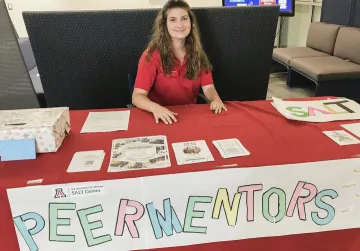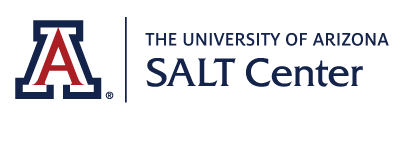Peer Mentors: The 'Face of Friendliness'
Laura Fuchs, Student Support Specialist
Isolation within the 50,000-person University of Arizona campus, a virtual mini-city, is real. “We have students sitting in the dorms by themselves hearing their neighbors having a good time, hearing people going to football games, and they don’t have anybody to go with.”
These are the observations of Natalie Schleining, who spearheaded the Peer Mentor program at the SALT Center in 2019 during her first semester as a Student Support Specialist. Seeing the need to curb the loneliness experienced by first-year students, especially those attending the SALT Center, Schleining suggested starting our Peer Mentor program.
After researching other college mentor programs, writing a handbook, and formulating a training manual, Schleining launched the program in the fall of 2021. The competitive interview process resulted in a handful of students from the SALT Center who were not only good communicators, but also approachable. One of the peer mentors participating in the 2021 pilot program, Olivia Brodersen, summed up her role as being, “the face of friendliness.”
Peer mentors commit to volunteering for one academic year as a step toward a paid SALT Center Ambassador position. Broderson, now an ambassador, sees the mentor program as a win-win for all. As a mentor, Brodersen gained interpersonal skills and witnessed the critical need for human contact. “With our generation, especially our generation, not everyone’s going to be social,” Broderson said. She believes meeting in-person with a peer mentor, instead of searching for answers on the internet, is more meaningful to a student. “We can search Google for ‘Why am I sad?’ and come up with 50-million answers why.” Like a friend, she wants them to know they’re not alone.

Knowledge of the campus and its resources, participation and extracurriculars are a must for mentors, but possessing empathy and the ability to give comfort are paramount. Incoming students are often “intimidated by professors and upperclassmen, they think they’re the only ones who are new and experiencing anxiety, so approachability is huge,” Schleining said.
Schleining sees herself as a guide. “It’s their group. It’s their program.” She tasked the mentors to come up with what they would like if they were “in the student’s shoes.” During meetings, the mentors brainstorm possibilities for workshops and events that would be useful for students making the transition to college. To reach out, mentors set up a weekly drop-in table in the lobby. Last semester, they promoted tips on studying for finals, along with time and stress management strategies. “It’s a great experience for them to have their hand in creating a program,” Schleining said.
According to their handbook, the role of a SALT Center Peer Mentor is to help build community and connections, promote social engagement, assist students with acclimating to campus life, and guide them through the University of Arizona and SALT Center communities. Mentors share what has worked for them in the areas of homesickness, roommate issues, academic self-advocacy, self-care and finding campus services.
Mari White, a 2022 participant, remarked that, “Being a Peer Mentor was a really fun and engaging way for me to be able to give back to my own community–people that I know are going through the same thing that I once had or am still dealing with.”
When a student is lonely, anxious or in need of someone to talk to, Schleining believes having access to a Peer Mentor may contribute to student retention. Schleining’s goal is to have every new student assigned a Peer Mentor. “Just having that to offer a new student coming into a scary situation is the most important thing to me.”
Students who would like to be connected with a Peer Mentor can talk to their Student Support Specialist or visit the Peer Mentor table during drop-in hours.

